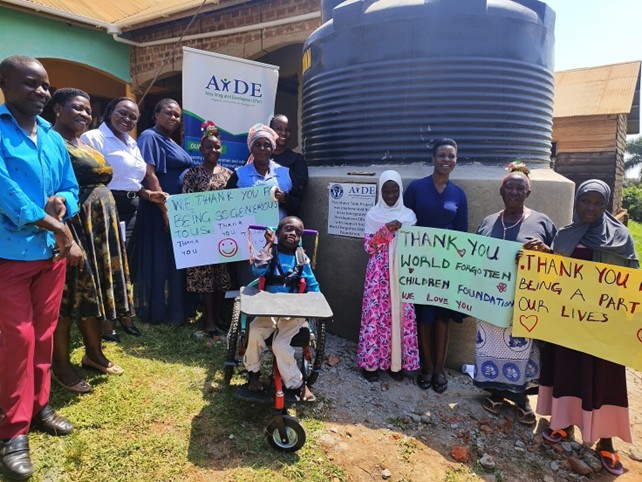
On November 3, 2024, World Forgotten Children Foundation (WFCF) funded the Inclusive Learning for Children with Physical and Intellectual Disabilities project in partnership with Arise Integrated Development Efforts (AIDE), a women-led nonprofit in Uganda. This transformative initiative empowered 24 children with disabilities and their caregivers in the Goma Sub-county of Uganda’s Mukono District, bringing hope, dignity, and opportunity to a community too often overlooked.
Creating Opportunities Through Inclusion
This project set out to address the critical needs of children with physical and intellectual disabilities by providing assistive devices, educational materials, and hygiene resources—essentials often out of reach for these families.
Implemented at St. Charles Lwanga Daycare in Bukerere, the initiative created a more inclusive, engaging, and supportive educational environment for these children. Through the provision of mobility aids, assistive learning tools, and caregiver training, the project dismantled systemic barriers and empowered children to participate more fully in both daily life and their educational journeys.
By equipping caregivers with knowledge and practical skills, the project also strengthened family support systems, fostering a more compassionate and informed community. Ultimately, this initiative not only enhanced the children’s learning experiences but also helped shift societal attitudes toward disability, championing inclusion and equal opportunity for all.
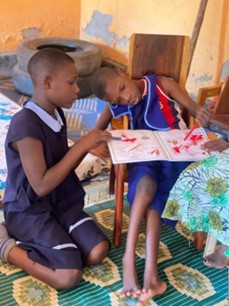
Key Interventions and Achievements
Restoring Mobility and Comfort
Twenty-four (24) children received wheelchairs (13), cerebral palsy chairs (5), orthopedic and resting mattresses (15), and one orthopedic device (1). These resources significantly enhanced their mobility, independence, and comfort, both at school and at home. Children who once relied entirely on others for movement can now navigate their environments with greater ease and confidence.
Supporting Learning and Play
To stimulate cognitive and motor skill development, assistive learning devices such as colored pencils, building blocks, and modeling clay were distributed. These materials encouraged creative expression, promoted academic growth, and fostered a stronger sense of self-worth.
Improving Health and Hygiene
As part of this project, AIDE also installed a 10,000-liter water tank at the St. Charles Lwanga Day Care, ensuring reliable access to clean water. This vital infrastructure improved hygiene standards and contributed to a healthier learning environment. A fully stocked first aid kit was also provided to address minor illnesses and prevent infections common among children with disabilities.
Strengthening Families and Community Capacity
Multi-Stakeholder Engagement
A total of 63 participants contributed to the project’s success, including caregivers, AIDE staff, government officials, MOTIVATE technical experts, and community workers. This collaborative approach ensured that interventions were inclusive, context-specific, and sustainable.
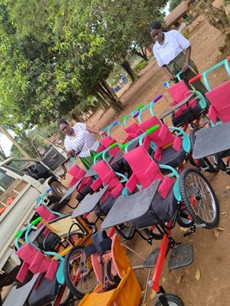
Infrastructure Improvements
With support from the Lottery Club of Sonde and the Association for Cerebral Palsy Uganda, an unfinished classroom was also renovated and completed. The new facility enables children, especially those traveling from distant areas, to stay at the daycare and access consistent educational support.
Caregiver Training
Caregivers received training on home-based therapies and the proper use of assistive devices. In collaboration with the Association for Cerebral Palsy Uganda, AIDE empowered parents with practical knowledge to support their children’s development beyond the classroom. Five caregiver support groups were also formed to foster peer learning and community solidarity.
Tangible Outcomes
- Increased School Attendance: Mobility aids enabled children to attend school more consistently.
- Greater Independence: Children gained the ability to perform daily tasks with reduced assistance.
- Enhanced Participation: Engagement in sports, creative activities, and social interaction rose markedly.
- Improved Health: Clean water, timely deworming, and access to first aid reduced the risk of illness.
- Elevated Confidence: Children demonstrated greater self-esteem through active participation in learning.
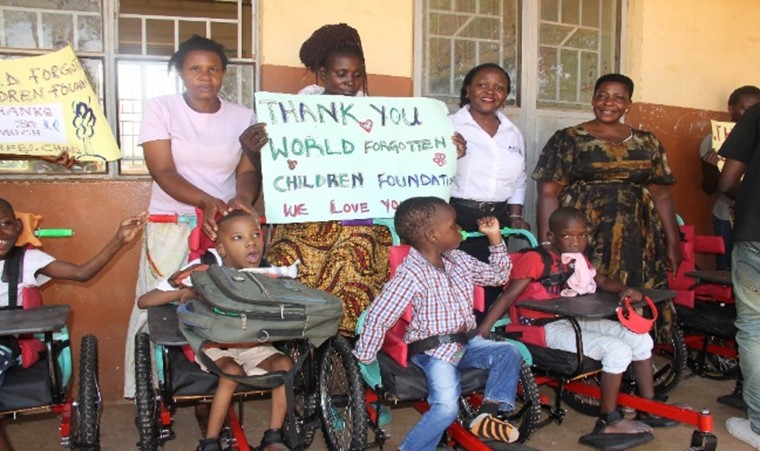
Challenges and Lessons Learned
Despite the project’s successes, several challenges emerged:
- Lack of Specialized Teachers: There is a pressing need for trained special education professionals to deliver individualized instruction.
- Caregiver Engagement: Some caregivers require continued sensitization and support to fully embrace their children’s potential.
- Feeding Difficulties: Selective eating habits among children raise concerns about nutrition and overall health.
These challenges offered critical lessons:
- Specialized Support Is Essential: Physical and speech therapy must be integrated into future programming to support mobility and communication.
- Assistive Devices Empower: Tools that aid movement, learning, and rest are transformative in daily life.
- Caregiver Involvement Is Key: Educating and empowering caregivers directly improves child development outcomes.
- Evaluation Drives Improvement: Ongoing assessment helps refine interventions and ensure lasting impact.
The Way Forward
To build on this momentum, AIDE recommend the following:
- Physical Therapy Services: Establish regular therapy sessions to improve mobility and reduce dependence on devices.
- Speech Therapy: Provide communication support to help children express their needs and engage socially.
- Adaptive Learning Materials: Expand access to tactile books, visual aids, and communication technology.
- Mental Health Support: Offer psychological services for children and caregivers to address emotional challenges and enhance resilience.
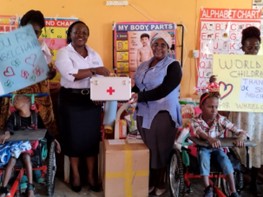
Advancing WFCF’s Mission
Since 2003, WFCF has been committed to improving the lives of children with disabilities in underserved regions. This initiative directly supports our mission to provide medical and therapeutic equipment, improve quality of life, and combat stigma and neglect. By promoting inclusion and addressing systemic barriers, we are helping children live with dignity and independence.
The Inclusive Learning for Children with Physical and Intellectual Disabilities project reinforces WFCF’s unwavering dedication to equitable education and holistic child development. By centering the needs of children with disabilities and working hand-in-hand with local communities, we continue to build a world where no child is forgotten.
Looking Ahead
This project is just one example of how your support makes a lasting difference. As we reflect on a year of progress, we are inspired to continue building inclusive, sustainable solutions that empower children with disabilities.
We extend our gratitude to our partners at AIDE, the dedicated caregivers and families in Mukono District, and to you—our donors and supporters. Thank you for believing in a world where no child is forgotten.
Help Us Continue This Mission
Make a difference by donating to WFCF—your support directly improves the lives of children with disabilities in communities that need it most. Together, we can reach more children, fund more initiatives, and build a future where every child—regardless of ability—can thrive.


